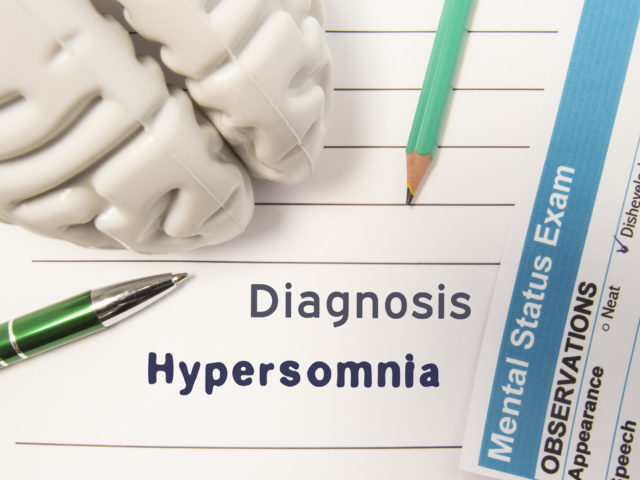Hypersomnia is excessive sleepiness. Someone who suffers from hypersomnia frequently feels the urge to take an instant nap at various times throughout the day, and they often could fall asleep at the drop of a hat even after having a full night’s sleep. Plus, they tend to sleep for unusually long periods at nighttime.
If you can’t keep your eyes open at certain times of the day when you need to be alert and awake, and you cannot attribute it to a normal lack of sleep, you may have hypersomnia. If you have fallen asleep even during a meal or in the middle of a conversation, it’s a good idea to see a doctor to find out whether you have this condition – and to get treatment if you do.
Being sleepy is not only inconvenient, but it can also have a negative effect on your professional and personal life. It is also dangerous – falling asleep while driving or while operating machinery would be a disaster.
Hypersomnia can be diagnosed by a specialized sleep doctor. There are two kinds of hypersomnia and several possible causes.
Primary Hypersomnia
Primary hypersomnia happens on its own, not due to another health condition – and it is relatively rare. People with primary hypersomnia get a lot of sleep at night, usually 10 hours or more, but still can’t stay awake during the day. This diagnosis can include idiopathic hypersomnia, narcolepsy, or Kleine-Levin syndrome, as described below:
Idiopathic hypersomnia (IH) is chronic sleepiness that is not relieved by sleep. In spite of a long night’s sleep or a nap, the person wakes up feeling just as sleepy as before. It is a neurological disorder that is not completely understood, but it is believed that the chemicals in the brain that control sleep are imbalanced or work differently than what is normal.
Narcolepsy is characterized by extreme sleepiness and can include additional symptoms of hallucinations, night terrors, and cataplexy (sudden loss of muscle control and/or collapse when the person has a sudden emotional reaction). Narcolepsy can also include sleep paralysis, which is when a person wakes up and cannot move right away; this inability to move can also occur when the person is falling asleep.
Kleine-Levin syndrome, or Sleeping Beauty syndrome, is characterized by episodes of hypersomnia along with mood changes and other cognitive symptoms. It usually appears in adolescents, and it tends to create cyclical episodes of hypersomnia that can last from days to weeks.
Secondary Hypersomnia
This condition is much more common than primary hypersomnia. There are many reasons why a person may feel excessively sleepy during the day that can be explained and more easily treated, including the following causes:
Depression
People with untreated depression often have sleep disorders or sleep disruption. They may have difficulty sleeping at night (insomnia) and so are extremely sleepy during the day. Or they may sleep long hours and still feel excessively sleepy when they wake up. Sleep problems are one of the first things doctors ask about when evaluating patients for depression.
Sleep Apnea
This is a sleep disorder whereby a person’s breathing is interrupted by the airway being blocked many times during the night. People with sleep apnea are at risk of other serious conditions, like heart disease and stroke. A sleep medicine specialist can help diagnose sleep apnea and prescribe a treatment that will allow you to breathe easily through the night.
Sleep Deprivation
Continuously not sleeping enough at night is also a leading cause of hypersomnia. Packing too many obligations and too much activity into every day can take too much time away from sleeping. Insomnia is also a problem for many people, as a person is trying to fall asleep but simply cannot.
Obesity
Being significantly overweight or obese increases the risk of sleep apnea and other sleep disorders. Losing weight can actually help the person to be able to sleep normally again.
Prescription and Recreational Drug Use
Certain drugs can cause insomnia at night and/or sleepiness during the day. These include stimulants and sedatives, antihistamines, and other types of drugs.
Sleep Medicine Specialists in North Carolina
Treating hypersomnia and other sleep problems depends on the underlying cause. Some cases can be resolved through behavioral changes or changes in medication, while others are more complex.
If you have excessive sleepiness or another sleep disorder, see a sleep specialist who can diagnose your condition. The right treatment could help restore restful sleep and allow you to be awake when you need to be.
With offices in Concord and Charlotte, North Carolina, our team at Gingras Sleep Medicine is ready to help you get a good night’s sleep. Call us today at (704) 944-0562 or fill out our online appointment request form, and we’ll help you get back on a regular schedule again – so you can enjoy normal, restful nights, and wake up every morning feeling bright and ready for the day.

